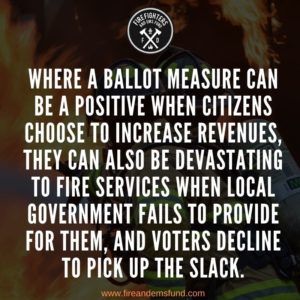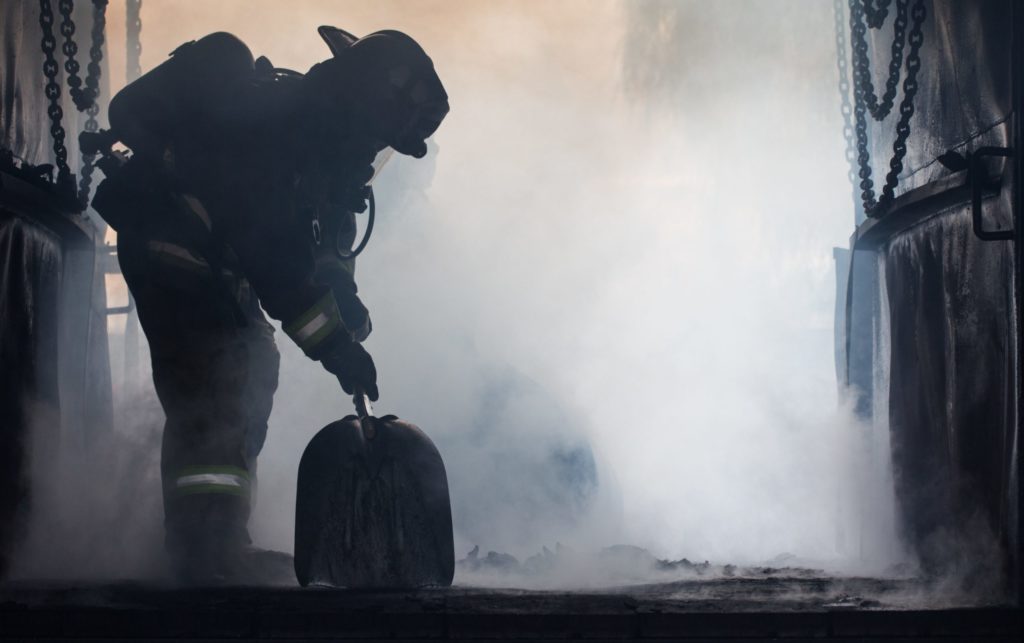Ballot Measures empower voters to have a direct impact on the laws affecting them in their local communities. Whether it be proposals to increase or reduce taxes or ordinances which impact their daily lives, ballot measures allow citizens to take a role in the legislative process where they live. If voters decide to raise their own taxes for instance, the benefits will often ripple across the community to positively impact public services like Fire Services, but sometimes these measures can have significant negative effects on these institutions. Public services are often funded because the government does not properly allocate money to fund them. So, where a ballot measure can be a positive when citizens choose to increase revenues, they can also be devastating to fire services when local government fails to provide for them, and voters decline to pick up the slack.
Here are six measures which failed at the ballot boxes this year, leading to decreased revenues for things such as Fire:
Refugee Canyon Joint Fire District
On November 3, voters in Hebron & Union Township, Ohio voted on whether they would agree to increased tax levy on their joint Refugee Canyon Joint Fire District. According to the Newark Advocate, “voters will decide whether to fund a recently formed fire district via an 8.5 mills, five year levy in November.” This would have resulted in a roughly 2% tax increase on property values, which was ultimately defeated at the ballot box. The Newark Advocate reports that “The fire district received 2,632 votes opposing the levy and 1,020 votes of support…”
McCammon, Idaho
Voters in McCammon, Idaho, needed a super majority to pass a measure allocating $1.1m for the construction of a new fire station. According to the Idaho State Journal, residents in “McCammon were seeking to replace its current undersized fire station after several community residents told McCammon City Council President Aaron Hunsaker about having to wait over half an hour for help to arrive during emergencies.” The measure would have raised taxes by $3-$5 per month, on homes worth $100-$150k, but failed to receive a super majority. The bond raising measure received 242 votes in favor and 130 against.
San Andreas & West Point, CA
Two California districts failed to pass measures in a special election in August seeking to raise funds for their respective fire services. San Andreas attempted to pass Measure A, “…which would have established a special annual tax of $300 on property owners in the San Andreas Fire Protection District,” according to The Calaveras Enterprise. The paper also reports that West Point attempted to pass Measure C which “…would have increased the existing special parcel tax by $180.” San Andreas was hoping to raise an additional $560k per year & West Point was hoping to raise $350k. San Andreas lost with 836 voting “no” to 532 “yes” votes. West Point voters had 63% approval for Measure C but needed a two-thirds majority to pass the initiative.

Newcastle, WA
In Washington State, Newcastle City attempted to raise funds for their emergency services, including fire, through an increased 3% utility tax. According to the Newcastle government website, “The proposed 3 percent utility tax would generate about $900,000 annually to fund City operating costs. This revenue estimate includes both residential and commercial utility customers’ contributions. It pencils out to about $8-14 a month, with the average Newcastle household paying about $10 a month to support critical City services like police and fire protection.” MRSC.org reports that the measure was soundly rejected: “…Newcastle voters rejected a 3% utility tax that would have generated almost $900,000 per year for police and fire services, with about 60% opposed.”
Los Angeles, CA
Earlier this year, voters in Los Angeles had the opportunity to vote on Measure FD during primary season. Measure FD “…would have established a 6-cents-per-square-foot parcel tax to pay for more county firefighters and upgrade fire equipment,” according to NBC Los Angeles. The measure was supported by local fire officials who note that increased call traffic has far outpaced the growth in the Department’s capabilities, according to CBS Los Angeles. “‘In the last decade, our call volume has gone up 50% while our staffing has only gone up 5%,’ Chief Daryl Osby said in support of the measure.” Ultimately, the measure failed to receive the required 67% percent approval to pass.
Marion County, OR
Marion County Fire District 1 received two blows this election year, as it twice hoped that ballot measures throughout the year would help raise fund and stave off layoffs within their ranks. When the first proposed levy increase of 99 cents per $1000 property value failed in May during primary season, Fire Chief Kyle McMann hoped that a reduced proposal of 71 cents per would pass. “In the fire service it takes people to respond to put out fires, help people in emergencies. Losing 30% of your revenue is heartbreaking,” McMann told The Salem Reporter. Unfortunately, the reduced measure failed in November, with fire officials anticipating that reduced staffing levels will lead to increased service times on calls beginning in January 2021.
The failure of these measures is a combination of a public unwilling to increase their own expenses and local governments which were not, or cannot, distribute their available funds to Fire Services adequately. In the example of Hebron, Ohio/Refugee Canyon Joint Fire Services, many residents opposed the creation of the joint fire service in 2019 in the first place, according to The Newark Observer. “Mark Weaver said hundreds of people are furious about the fire district because it will ‘require property owners to pay more and get less fire protection.’” In the case of Measure FD in LA, opposition cited the homelessness crisis in the city and fears that increased taxes would lead to higher rent and utilities: “The California Taxpayers Association opposed the measure, arguing that it will make it more expensive to buy or rent property and will also increase utilities.” In other cases, support was simply unable to reach 2/3 super majorities required to pass, meaning over half of the public at large supported these measures, despite the failure. The common thread throughout these cases is that the government is not budgeting properly and are deferring to voters to bail them out. Like on most subjects in American politics, the issue of raising taxes has divided support. The relative wealth of a community does not seem to directly predict if they will vote to increase their own taxes, so governments must find better ways to spend responsibly and prioritize the public programs like Fire which are essential to their communities.
When Congress passed the CARES Act, much needed financial assistance was given to small business, corporations, individuals, and emergency services. But in the chronically underfunded world of Fire & EMS Services, the money emergency funds dispersed were still not enough to avoid budget cuts, loss of pay, and layoffs.









